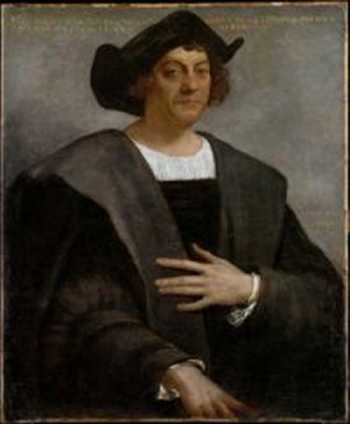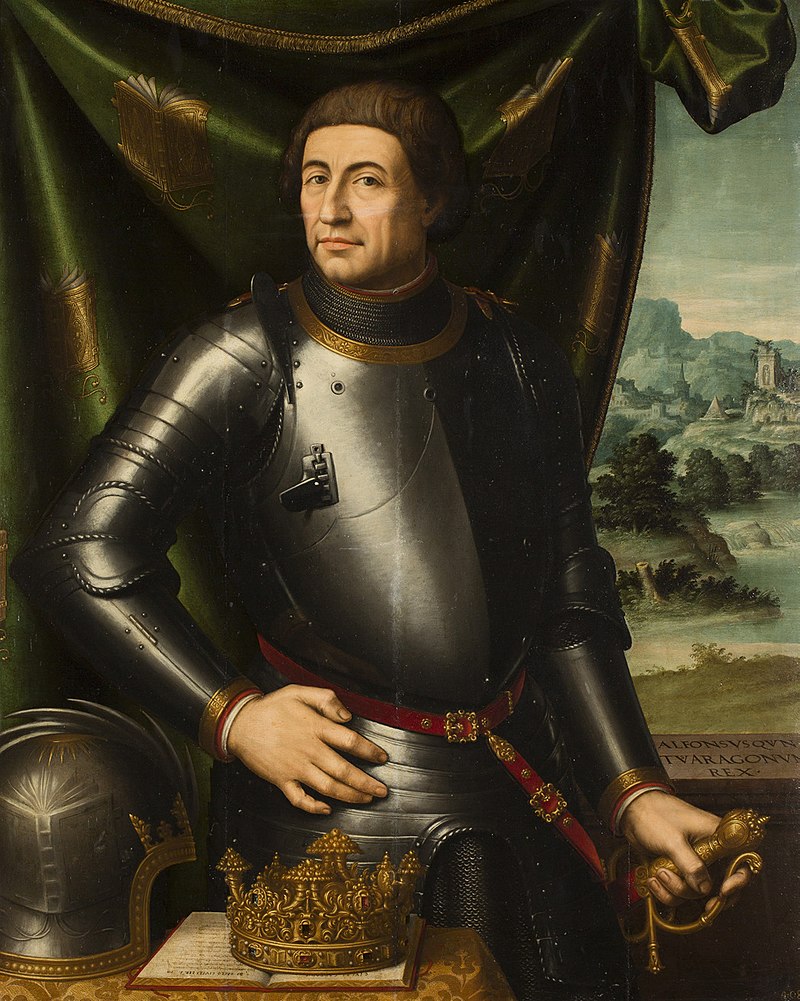February 24
Saint’s Day for Modesto, Sergio and Lucio
1503 - Christopher Columbus founds the first Spanish settlement in continental America, Santa María de Belén, in Panama.

Christopher Columbus - www.wikipedia.org
1524 - Pope Clement VII granted to the Inquisition of Aragon to court over sodomy, causes or is not heresy.
1525 - A Spanish-Austrian army defeats a French army at the Battle of Pavia.
1821 - Final stage of the Mexican War of Independence from Spain with Plan of Iguala.
1895 - Revolution breaks out in Baire, a town near Santiago de Cuba, beginning the Cuban War of Independence; the war ends along with the Spanish - American War in 1898
1908 - Bishop of Barcelona published a pastoral against the project of the City of creating schools' bisexual and neutral.
1909 - Galdos Theatre in Las Palmas drama premieres The Sphinx, first dramatic production of Miguel de Unamuno.
1925 - in Granada tram to Sierra Nevada (14 tunnels and 21 bridges in its 20 km long), which allows communication between many towns in the province is inaugurated.
1933 - Spanish Cortes ratify the confidence to the government by 173 votes to 130 in the discussion of the events of Casas Viejas.
1937 - Soviet Union prohibits sending volunteers to the Spanish Civil War.
1950 - Anarchist Manuel Sabater was shot dead in Barcelona.
1955 - Barcelona Hall of the XXIX Spanish Fashion is inaugurated.
1967 - Juan March Foundation acquires Cantar de mio Cid (the most valuable manuscript of the National Library) in 10 million pesetas.
1976 - In Madrid, the World Tourism Organization set up his headquarters.
1978 - Enrique Fuentes Quintana, Second Vice President and Minister of Economic Affairs of Spain, resigns, Adolfo Suarez circumstances fail to make other changes in the Cabinet formed a year ago.
1981 - Lt. Col. Antonio Tejero, after holding hostage the Government and the Spanish Members for nearly 20 hours, delivered to government forces. He was arrested, too, General Jaime Milans del Bosch and other partners in the failed coup.
1981 - at the Berlin Film Festival, the film Hurry, hurry (directed by Carlos Saura) won the Golden Bear.
1983 - The Spanish government approves the draft incompatibilities for high office.
1985 - in Cardedeu (Barcelona) finishes the first congress of the Spanish "green movement."
1987 - Cardinal Archbishop of Madrid-Alcala, Angel Suquía, is elected president of the Spanish Episcopal Conference.
1988 - the businessman, Emiliano Revilla, is kidnapped by ETA terrorists in Madrid and held captive for 249 days before his release.
1989 - In Spain, the Council of Ministers approves the full incorporation of women to all weapons, and grades of the armed forces, but has no obligation to perform military service.
2000 - A group of Spanish researchers from the CSIC and the UNED achieved that paraplegic rats return to walk.
2006 - Spain decides to open permanent embassies in New Zealand, Sudan, Trinidad and Tobago and Yemen.
2006 - Italian writer Claudio Magris is invested doctor honoris causa by the Complutense University of Madrid.
1525 - A Spanish-Austrian army defeats a French army at the Battle of Pavia.
1821 - Final stage of the Mexican War of Independence from Spain with Plan of Iguala.
1895 - Revolution breaks out in Baire, a town near Santiago de Cuba, beginning the Cuban War of Independence; the war ends along with the Spanish - American War in 1898
1908 - Bishop of Barcelona published a pastoral against the project of the City of creating schools' bisexual and neutral.
1909 - Galdos Theatre in Las Palmas drama premieres The Sphinx, first dramatic production of Miguel de Unamuno.
1925 - in Granada tram to Sierra Nevada (14 tunnels and 21 bridges in its 20 km long), which allows communication between many towns in the province is inaugurated.
1933 - Spanish Cortes ratify the confidence to the government by 173 votes to 130 in the discussion of the events of Casas Viejas.
1937 - Soviet Union prohibits sending volunteers to the Spanish Civil War.
1950 - Anarchist Manuel Sabater was shot dead in Barcelona.
1955 - Barcelona Hall of the XXIX Spanish Fashion is inaugurated.
1967 - Juan March Foundation acquires Cantar de mio Cid (the most valuable manuscript of the National Library) in 10 million pesetas.
1976 - In Madrid, the World Tourism Organization set up his headquarters.
1978 - Enrique Fuentes Quintana, Second Vice President and Minister of Economic Affairs of Spain, resigns, Adolfo Suarez circumstances fail to make other changes in the Cabinet formed a year ago.
1981 - Lt. Col. Antonio Tejero, after holding hostage the Government and the Spanish Members for nearly 20 hours, delivered to government forces. He was arrested, too, General Jaime Milans del Bosch and other partners in the failed coup.
1981 - at the Berlin Film Festival, the film Hurry, hurry (directed by Carlos Saura) won the Golden Bear.
1983 - The Spanish government approves the draft incompatibilities for high office.
1985 - in Cardedeu (Barcelona) finishes the first congress of the Spanish "green movement."
1987 - Cardinal Archbishop of Madrid-Alcala, Angel Suquía, is elected president of the Spanish Episcopal Conference.
1988 - the businessman, Emiliano Revilla, is kidnapped by ETA terrorists in Madrid and held captive for 249 days before his release.
1989 - In Spain, the Council of Ministers approves the full incorporation of women to all weapons, and grades of the armed forces, but has no obligation to perform military service.
2000 - A group of Spanish researchers from the CSIC and the UNED achieved that paraplegic rats return to walk.
2006 - Spain decides to open permanent embassies in New Zealand, Sudan, Trinidad and Tobago and Yemen.
2006 - Italian writer Claudio Magris is invested doctor honoris causa by the Complutense University of Madrid.
2014 - Vodafone has now installed fibre optic in 100,000 homes in Spain and they are to start a pilot program with people in Madrid and Sevilla.
2015 - Debate on the State of the Nation, the last of the legislature
2015 - Debate on the State of the Nation, the last of the legislature
2020 - Spain is the European Country to receive most asylum requests with the pressure from Latin America – Venezuela and Colombia amount to 60% of the requests, which have reached 3,500 a week – Blanca Garcés-Mascareñas is a researcher specialist in migrations, and she notes while before people were fleeing from war, now they are fleeing from imposed poverty
Births
Births

Alfonso V of Aragón - https://es.wikipedia.org/wiki
1396 - Alfonso the Magnanimous was the King of Aragon (as Alfonso V), Valencia (as Alfonso III), Majorca, Sardinia and Corsica (as Alfonso II), Sicily (as Alfonso I) and Count of Barcelona (as Alfonso IV) from 1416, and King of Naples (as Alfonso I) from 1442 until his death. He was one of the most prominent figures of the early Renaissance and a knight of the Order of the Dragon. (d, 1458)
1500 - Carlos V King of Spain (1516-56) and Holy Roman Emperor (1519-56) born in Ghent, Flanders, Habsburg Netherlands (d. 1558).
1545 - Juan de Austria, soldier (d. 1578).
1818 - Francisco Jareño y Alarcón, architect (d. 1892).
1830 - Narciso Serra, poet and dramatist (b. 1877).
1837 - Rosalía de Castro, poet (d. 1885)
1852 - Francisco Javier Ugarte Pagés, politician (d. 1919).
1885 - Modesto López Otero, architect (d. 1962).
1500 - Carlos V King of Spain (1516-56) and Holy Roman Emperor (1519-56) born in Ghent, Flanders, Habsburg Netherlands (d. 1558).
1545 - Juan de Austria, soldier (d. 1578).
1818 - Francisco Jareño y Alarcón, architect (d. 1892).
1830 - Narciso Serra, poet and dramatist (b. 1877).
1837 - Rosalía de Castro, poet (d. 1885)
1852 - Francisco Javier Ugarte Pagés, politician (d. 1919).
1885 - Modesto López Otero, architect (d. 1962).
1890 - Antonio Massana, composer (Canigo) and Jesuit priest, born in Barcelona (d. 1966)
1924 - Bartolomé Escandell, historian (d. 2012).
1929 - Luis Carandell, writer and journalist (d. 2002).
1949 - Enrique Rojas, psychiatrist.
1950 - Miguel Arias Cañete, politician.
1950 - Daniel Txopitea, painter and sculptor (f. 1997).
1950 - The Partido Popular politician and former Minister for Agriculture, Miguel Arias Cañete, was born in Madrid
1957 - Rafael Gordillo, footballer.
1969 - Goya award-winning actor, Fernando Tejero, in Córdoba.
1971 - Pedro de la Rosa, Spanish race car driver
1973 - Fernando Hernández, handball player.
1979 - Ainhoa Arbizu, journalist.
Deaths
1894 - Canuto Berea Rodríguez, orchestra conductor, violinist and composer (b. 1836).
1960 - Antonio Vallejo-Nágera, psychiatrist (b. 1889).
1973 - The celebrated flamenco singer, Manolo Caracol, died in a traffic accident in Aravaca.
1983 - Agapito Marazuela, musician (b. 1891).
1991 - Héctor Rial, hispano-argentina footballer (b. 1928).
1993 - Hernando Viñes, painter (b. 1904).
2003 - Antoni Torres, footballer (b. 1943).
1924 - Bartolomé Escandell, historian (d. 2012).
1929 - Luis Carandell, writer and journalist (d. 2002).
1949 - Enrique Rojas, psychiatrist.
1950 - Miguel Arias Cañete, politician.
1950 - Daniel Txopitea, painter and sculptor (f. 1997).
1950 - The Partido Popular politician and former Minister for Agriculture, Miguel Arias Cañete, was born in Madrid
1957 - Rafael Gordillo, footballer.
1969 - Goya award-winning actor, Fernando Tejero, in Córdoba.
1971 - Pedro de la Rosa, Spanish race car driver
1973 - Fernando Hernández, handball player.
1979 - Ainhoa Arbizu, journalist.
Deaths
1894 - Canuto Berea Rodríguez, orchestra conductor, violinist and composer (b. 1836).
1960 - Antonio Vallejo-Nágera, psychiatrist (b. 1889).
1973 - The celebrated flamenco singer, Manolo Caracol, died in a traffic accident in Aravaca.
1983 - Agapito Marazuela, musician (b. 1891).
1991 - Héctor Rial, hispano-argentina footballer (b. 1928).
1993 - Hernando Viñes, painter (b. 1904).
2003 - Antoni Torres, footballer (b. 1943).
